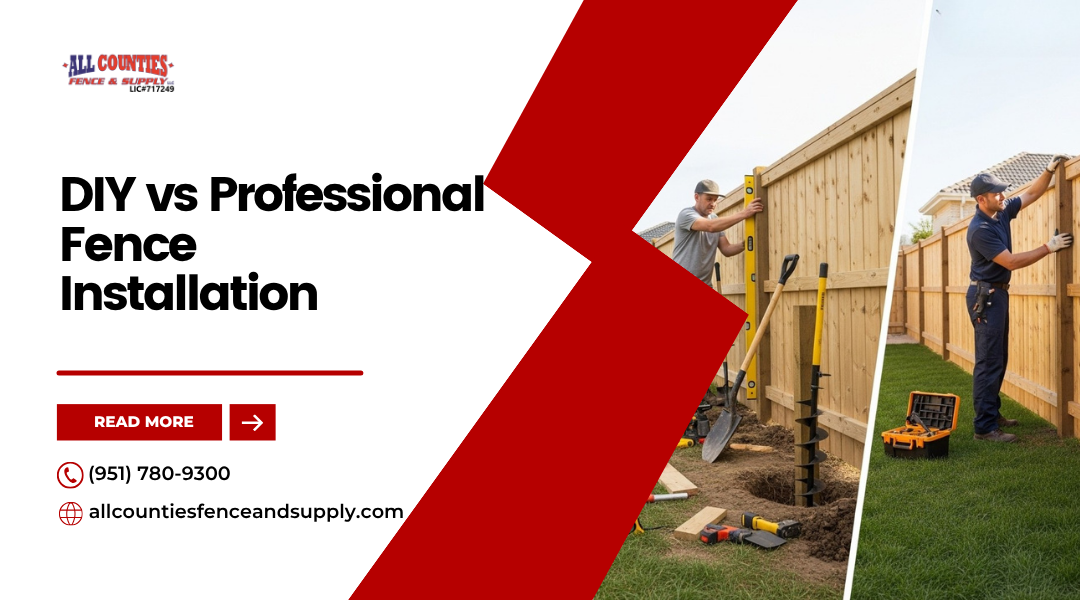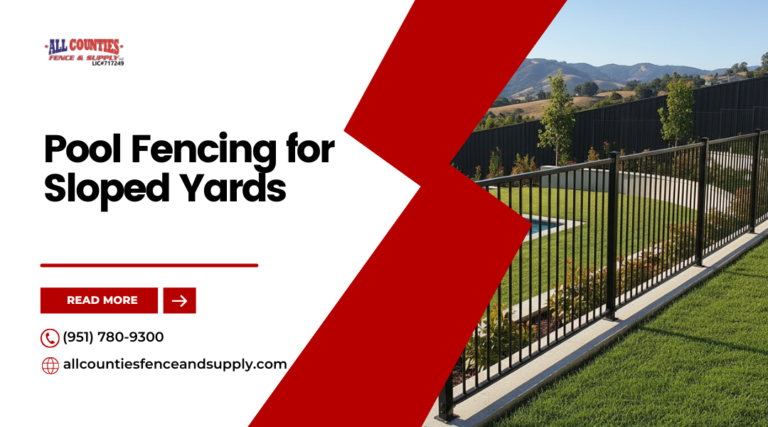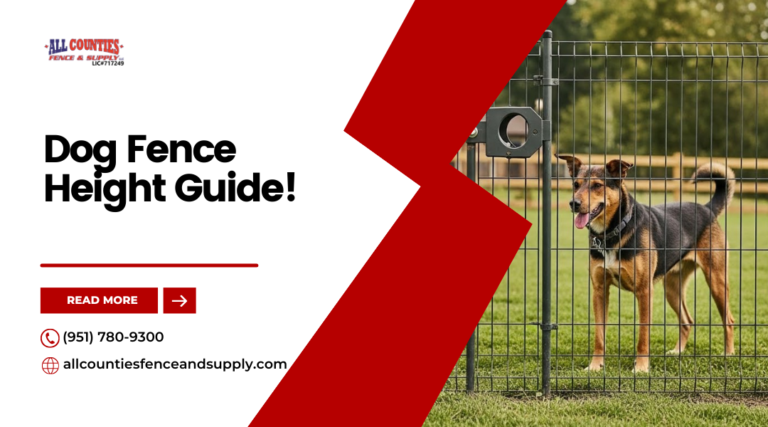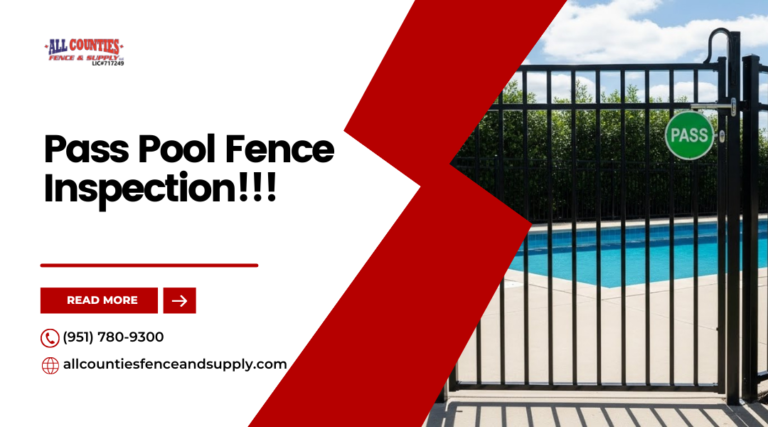When it comes to fence installation, you face a crucial choice: DIY or hire a professional. Choosing a professional service like All Counties Fence & Supply can save you time, ensure quality craftsmanship, and enhance your property’s curb appeal. While a DIY project may seem rewarding and cost-effective, it often lacks the expertise that professionals bring to the table.
Understanding the intricacies of fence installation can be challenging. Factors like local regulations, proper material selection, and installation techniques play a significant role in the outcome. By opting for a professional, you benefit from their experience and knowledge, helping you avoid potential mistakes that could affect the security and aesthetics of your property.
This article will explore the advantages and disadvantages of both options to help you determine what’s right for you. Whether you prioritize saving money or ensuring high-quality results, we’ll guide you through the decision-making process.
Understanding Your Fence Installation Options
When choosing how to install your fence, you’ll want to understand the differences between DIY and professional installation. Each option has unique steps, costs, and advantages that can affect your decision.
What Does DIY Fence Installation Involve?
If you decide to install the fence yourself, there are several steps you’ll need to take. First, planning is key. You need to measure your yard and determine where the fence will go. It’s essential to check local regulations regarding fence height and placement.
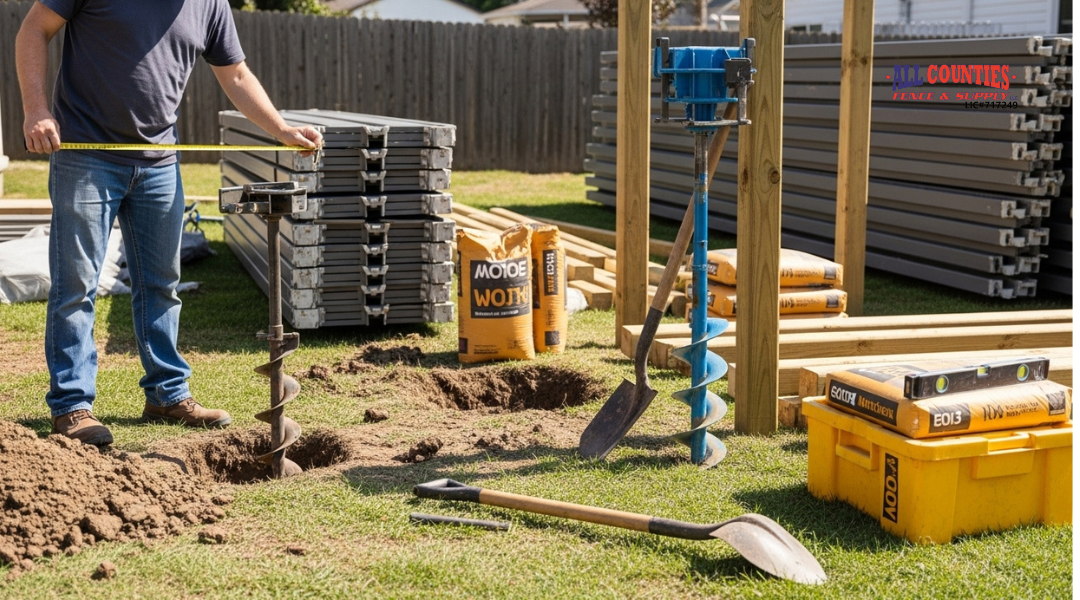
Next, you must gather materials, tools, and equipment. Common items include:
- Fence panels
- Posts
- Concrete
- Tools like a post hole digger and level
Installation involves digging holes for posts, setting them in concrete, and attaching panels. This process can be labor-intensive and time-consuming. You should also consider potential challenges, such as uneven ground or weather conditions. If you have the skills and time, DIY can save you money.
What Is Included in Professional Fence Installation?
Choosing a professional fence installation typically means a more efficient and streamlined process. A fence contractor will start with a consultation to understand your needs and preferences.
Once you agree on designs, the contractor handles all aspects of the installation. This includes obtaining permits, which is crucial for compliance with local laws. The team will bring all needed materials and tools, ensuring everything is of high quality.
Professionals also come equipped to address challenges quickly. They can manage difficult terrain and adjust to any unforeseen issues during installation. This usually results in a cleaner, more reliable finish. Although it may cost more, the time saved and reduced hassle can make professional installation a wise choice.
Key Factors to Consider Before Making a Choice
Choosing between DIY and professional fence installation depends on several important factors. You need to evaluate your budget, the time you can commit, your skill level, and the local regulations that apply in Riverside, CA. Each of these areas will influence your final decision.
Budget Constraints and Cost Comparison
When considering your budget, think about both initial expenses and potential long-term costs. DIY fence installation may seem cheaper, but factor in tool purchases and material costs.
Professional installation typically has higher upfront costs due to labor, but it often ensures quality. You might pay roughly $1,500 for a professional install compared to about $800 for DIY. Weigh the potential for missed mistakes or increased expenses from doing it yourself.
Time Commitment and Project Timeline
Assess how much time you can realistically dedicate to the project. If you have a busy schedule, hiring a professional can be more convenient. Professionals can usually complete the job faster because they have the necessary tools and experience.
If you choose DIY, be prepared for a time-consuming process. Depending on your skills and the project’s complexity, it can take days or even weeks to finish. If you want the fence up quickly, consider professional help.
Skill Level and Tools Required
Your experience level plays a big role in your decision. If you’re handy and familiar with tools, DIY might be a good fit. However, if you lack experience, you risk making costly mistakes.
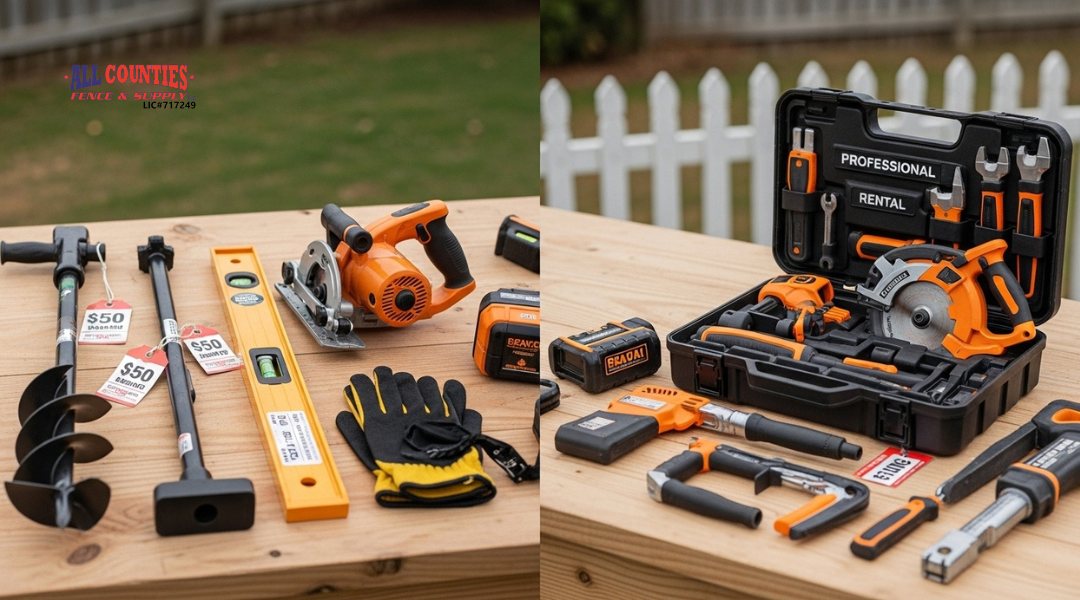
You will need several tools for DIY, such as a post hole digger, level, and saw. If you don’t own these, you’ll need to either buy or rent them. On the other hand, professionals come equipped with all the necessary tools and expertise.
Local Permits and Zoning Regulations in Riverside, CA
Before starting any fence installation, check the local regulations in Riverside, CA. You may need a permit, especially if your fence exceeds a certain height or is near property lines.
Contact the Riverside planning department to understand the zoning regulations. Being aware of these rules can help avoid fines or issues with neighbors. Understanding local guidelines ensures that your fence is compliant and no disputes arise.
Pros and Cons of DIY Fence Installation
Thinking about installing your own fence? It’s important to weigh the benefits and drawbacks. DIY installation can save you money and provide personal satisfaction, but it also comes with challenges that need careful consideration.
Advantages of Going the DIY Route
One of the main benefits of DIY fence installation is cost savings. You avoid labor costs, allowing you to allocate funds for better materials or other home projects.
Flexibility is another perk. You can work at your own pace, fitting the project into your schedule without being rushed. Whether you’re a weekend warrior or have more time to dedicate, you choose when and how to work.
Moreover, completing the project yourself gives you a sense of accomplishment. You get to see the direct results of your hard work. This can lead to pride in your property and a stronger connection to your home.
Lastly, you have complete control over the materials and design. Choose what fits your style and needs without compromises.
Challenges and Risks of DIY Installation
DIY projects are not without challenges. One major risk is the potential for mistakes. Improper measurements, weak foundations, or poor installation can lead to issues later, such as leaning fences or repairs.
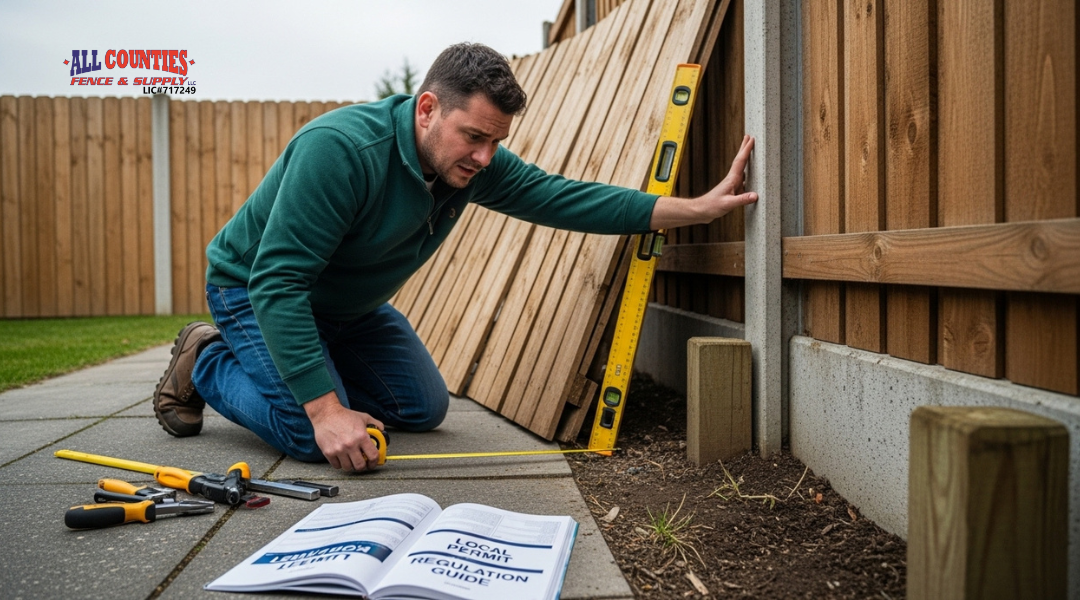
You also need to consider your skill level. If you lack experience, the project may take much longer than expected. This can result in additional stress and frustration as deadlines are pushed back.
Maintenance becomes another area of concern. Without professional guidance, you may overlook important upkeep tasks, leading to quicker deterioration of the fence. Ensure you know how to maintain your fence properly to avoid costly repairs down the road.
In some cases, local regulations or homeowner association rules may require permits or specific installation practices. This can add complexity to your DIY plans, so be sure to research beforehand.
Pros and Cons of Hiring a Professional Fence Contractor
When considering a professional fence contractor, it’s essential to weigh the advantages against the potential downsides. Hiring an expert can make a significant difference in the quality and efficiency of your fence installation.
Benefits of Working with a Fence Contractor in Riverside
Choosing a professional fence contractor offers several important benefits. First, you gain access to quality workmanship. Contractors have the skills and experience needed to ensure your fence is built correctly and lasts for years.
You also save time. A professional can complete the installation much faster than you might on your own. They manage everything from permits to cleanup. This leaves you free to focus on other tasks.
Additionally, a contractor like All Counties Fence & Supply knows local regulations and codes. This knowledge helps you avoid potential legal issues. With their expertise, you can feel confident that your project will meet all requirements.
Potential Downsides to Professional Installation
While hiring a professional has many benefits, it’s not without drawbacks. The most notable is the cost. Professional installation can be significantly more expensive than a DIY approach.
Labor costs can add up quickly. You might pay double the price compared to doing it yourself. This can be a barrier for some homeowners.
Another downside is scheduling. You may need to wait for availability, especially during peak seasons. This could delay your project, especially if you have a specific timeline in mind.
Lastly, you need to find a trustworthy contractor. Not all contractors provide the same level of service, so research is critical. Ensure you select a reputable contractor to avoid issues with quality.
Types of Fencing and Their Installation Complexity
Choosing the right fencing type involves understanding their installation complexity. Each type of fence has unique features and requirements. Here, you will find details about different fencing options to help you make an informed decision.
Wood Fences
Wood fences are popular for their natural look and ability to provide privacy. They can be built as picket fences or solid privacy fences, which can affect installation complexity.
For a basic wood fence, you will need panels, posts, rails, nails or screws, and tools such as a level and post hole digger.
Installation Steps:
- Measure the area and mark post locations.
- Dig holes for the posts, ensuring they are deep enough for stability.
- Set the posts in concrete, allowing them to cure.
- Attach the rails and then the fence panels or boards.
Expect installation to take longer if you opt for decorative features.
Vinyl and PVC Fences
Vinyl fences offer a low-maintenance alternative to wood. They come in various styles, including privacy and picket designs.
While vinyl fencing is generally easier to install due to its lightweight material, it still requires careful planning.
Installation Requirements:
- Check local codes and regulations for height and setbacks.
- Gather tools like a level, measuring tape, and a circular saw for cutting panels.
- Like wood, you will install posts first, making sure they are level and secure.
Vinyl does not warp like wood, making it a durable choice for those wanting longevity.
Wrought Iron and Steel Fences
Wrought iron and steel fences are known for their strength and elegance. They are often used for decorative purposes and security.
Installation can be more complex due to the weight of the materials. Special tools, like a welding machine, may be necessary.
Installation Tips:
- Begin by planning your design and measuring the space accurately.
- Install strong gate posts and corner posts first, as they will support the entire structure.
- Securely attach the panels, which may require assistance due to their heavy weight.
Consider hiring a professional if you lack experience with heavy materials.
Chain-Link Fences
Chain-link fencing is a cost-effective option that allows for visibility and security. It is commonly used for residential and commercial properties.
Installation is relatively straightforward, making it ideal for DIYers.
Key Steps:
- Mark the layout and set your terminal posts at corners and gate openings.
- Install the posts in concrete and ensure they are level.
- Unroll the chain-link fabric and attach it to the posts with ties.
This type of fencing usually requires fewer tools and is quicker to install compared to others.
Each type of fencing has specific installation steps and considerations. Understanding these will help you choose the best option for your needs.
When DIY Might Be the Right Choice
Choosing to install a fence yourself can be a smart decision under certain conditions. If you have a small project, or if you have experience with similar tasks, tackling the installation on your own can save money and give you a sense of accomplishment.
Small-Scale Projects
For smaller fencing projects, DIY installation can be quite manageable. A short fence along a garden or around a small area in your yard might not require professional tools or advanced skills.
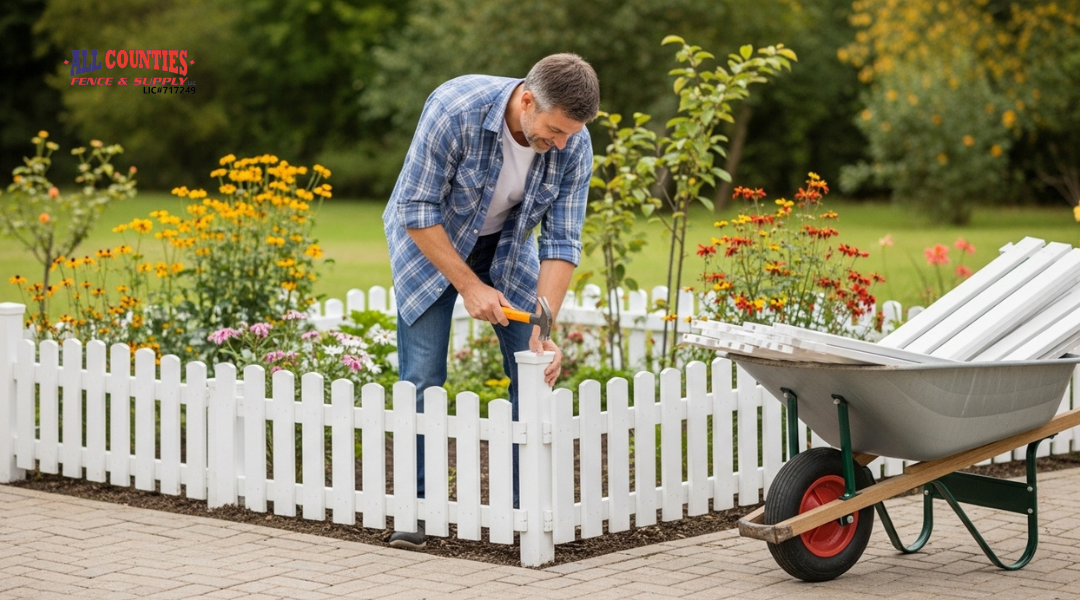
You can often complete these projects in a weekend. This flexibility allows you to work at your own pace. With a little planning, you can gather the necessary materials from a local supplier like All Counties Fence & Supply.
Additionally, smaller projects usually mean fewer permits or regulations to navigate. Keep in mind the design and materials you choose should fit your space and purpose. Simple designs, such as picket or chain-link fences, are often easier for beginners to install.
Previous Experience with Similar Installations
If you have prior experience with fence installation or other home improvement projects, DIY might be a viable option for you. Skills like measuring, digging, and using basic tools will make the process smoother.
Consider what tools you already own and any extra equipment you might need. Your past experiences can also guide your decision on materials, ensuring you select what suits your needs best.
Having a solid plan before you start can help you avoid common pitfalls. If you’ve tackled tasks like landscaping or building furniture, you likely possess the needed skills. Trusting your ability can lead to a successful DIY fence installation.
When to Hire a Professional Like All Counties Fence & Supply
Deciding between a DIY or professional fence installation can be a tough choice. There are specific situations where hiring an expert like All Counties Fence & Supply is the best option. This can ensure quality, a stronger finished product, and peace of mind.
Complex or Large-Scale Projects
If your fencing project is large or intricate, a professional is often the best choice. Such projects require specialized tools and skills that you may not have.
Large yards or irregularly shaped areas can complicate the installation. Professionals can manage these challenges efficiently, ensuring the fence fits perfectly.
Additionally, they understand local building codes and regulations. This is crucial for permits and safety standards. A pro can navigate these requirements smoothly to avoid any issues, making your life easier.
Need for Customization or Specialty Materials
When you want a fence that stands out or needs specific materials, hiring a professional is wise. Custom designs require experience to execute properly.
Professionals like All Counties Fence & Supply have access to a wider range of materials and styles. They can help you choose the best options for your needs and budget. You may want a unique design, which requires custom cuts or patterns that are hard to achieve on your own.
Additionally, using specialty materials may require special installation techniques. Professionals are trained to handle these materials, ensuring durability and a polished look.
Ensuring Long-Term Durability and Warranty Support
A fence is a long-term investment in your property. Hiring a professional can guarantee better durability. Their experience allows them to install the fence correctly, minimizing future problems.
Many professionals also offer warranty support. This means if something goes wrong, you can get help without additional costs. Knowing you have this safety net can provide peace of mind.
When you choose All Counties Fence & Supply, you benefit from their knowledge and reliable service. This ensures your fence lasts for years to come, giving you confidence in your investment.
Cost Comparison: DIY vs Professional Installation in Riverside, CA
When considering whether to tackle a fence installation yourself or hire professionals, cost is a major factor. You’ll want to understand both the initial expenditures and any hidden costs that might arise.
Initial Costs vs Long-Term Value
DIY fence installation may seem cheaper at first. You save on labor costs, which can be significant. Basic materials for a wooden fence might range from $1,500 to $3,000 depending on size and style.
However, hiring a professional can cost between $3,000 and $6,000, including labor and materials.
While the initial price is higher, professionals often offer warranties and quality assurance. This could save you money in the long run by reducing repairs or replacements.
When you weigh the upfront cost against potential long-term savings, it’s important to consider how much time and effort you’re willing to invest.
Hidden Expenses to Watch Out For
With DIY projects, hidden costs can quickly add up. For instance, tools you don’t own may need to be rented or purchased. This can add $100 to $500 more to your budget.
Permitting fees in Riverside could range from $200 to $400, depending on local regulations. Make sure to budget for these costs to avoid surprises.
On the other hand, professional installers often include cleanup and removal of old fencing in their quotes. This can save you from incurring additional disposal fees.
Understanding these hidden expenses can lead to a more accurate comparison between DIY and professional installation.
Why Choose All Counties Fence & Supply
When selecting a fencing contractor, it’s important to consider expertise, customization options, and the reliability of your service provider. All Counties Fence & Supply stands out in Riverside, California, for its deep knowledge of the local area and commitment to customer satisfaction.
Our Expertise and Local Knowledge
With over 40 years of experience, All Counties Fence & Supply has a strong grasp of the unique fencing needs in Riverside. Their team understands the local climate, terrain, and regulations that affect installations.
You benefit from their specialized knowledge, ensuring your fence is appropriate for your property and meets all legal requirements.
Their skilled professionals have tackled a wide range of fencing projects, from residential to commercial. This broad experience means they can anticipate potential challenges and implement effective solutions promptly.
Custom Solutions and Quality Materials
At All Counties Fence & Supply, your fencing needs are met with tailored solutions. Their team collaborates with you to design a fence that complements your property while fulfilling your specific requirements.
You have access to a variety of materials, including wood, vinyl, and chain link. Each option is chosen for its durability and aesthetic appeal, ensuring your fence lasts and enhances your property’s beauty.
With custom designs, you can create a unique look that reflects your style and needs. The company prides itself on using high-quality materials to ensure a long-lasting installation.
Licensed, Insured, and Customer-Focused
All Counties Fence & Supply is fully licensed and insured, which provides peace of mind for you as a homeowner. This professionalism means you are protected throughout the fencing process.
The company’s approach to customer service is centered on your satisfaction. They listen to your concerns and provide clear communication at every step.
Expect their team to be punctual, respectful, and dedicated to delivering excellent results. This commitment fosters trust and confidence, making your fencing project efficient and hassle-free.

